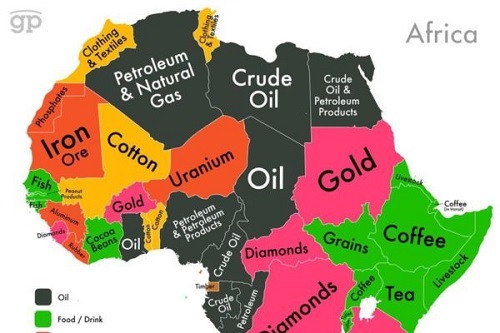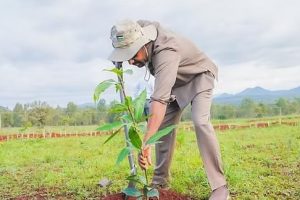
BY DARGIE KAHSAY
Despite its less contribution to greenhouse gas emission, Africa remains the most vulnerable continent to climate change and its impacts. As its economy mainly depends on nature and rainfed agriculture, the African continent is experiencing food insecurity and shortage of nutrition.
Its economy is also affected by droughts, flood and other natural disasters and climate related changes. To develop resilience, the continent needs action in protecting its natural resources, investing in nature and developing the culture of conservation and reforestation. The continent should enhance its investment applying both adaptation and mitigation measures to develop resilience to climate change and its impacts.
Though it varies from region to region, the continent as a whole faces climate change which has imposed impacts as a result of which people of the continent face serious food insecurity problems.
Since climate change is worsening from year to year, it predicts that climate change remains the top challenge to humans residing globally and continentally. That is why the African continent needs to take concrete actions to manage the impacts.
Indeed, Africa should take climate change and natural protection as its priority agenda. This week, Director General of Environmental Protection Authority (EPA) of Ethiopia Getahun Garedew (PhD) received officials from Inter African Bureau for Animal Resource and African Net-work for Animal Welfare in his office and discussed the upcoming United Nations Environment Assembly. The officials mainly discussed ways of developing active participation of the African continent during the assembly.
According to the officials from the two African institutions, Ethiopia’s voices are strongly mobilizing Africa in political and economic agendas at continental and global levels. Hence, they call up on Ethiopia to mobilize Africa in the environment sector to develop the continent’s resilience to climate change and to develop actions and investments in protecting nature with pan- Africanism sentiment.
During his opening remark at the 35th Ordinary session of the African Union (AU) summit, Ethiopian Prime Minister Abiy Ahmed (PhD) stated that to realize the continent’s agenda 2063, it requires extraordinary efforts collectively. “Our theme for the 2022 summit is nutrition and food security” Premier Abiy stated adding
“Over the past year, acute food insecurity in Africa has increased by 60 per cent as the effects of COVID-19 continue to aggravate our fragile economies”
The Premier underlined that floods, drought, desert locust and other climate related natural disasters have increased food insecurity for millions of citizens in the African continent. “With 60 percent of world’s arable land in Africa, it is important to use our natural asset to mobilize agricultural output and feed our people without reliance on external assistance.”
To properly exploit the continent’s capacity in productivity, mainly agricultural productivity, Dr. Abiy noted that, it is necessary to invest on nature and environmental protection unilaterally and collectively.
Explaining Ethiopian experience in environmental protection to the African leaders, Premier Abiy stated that Ethiopia has planted over 18 billion seedlings since 2019 with national motto of “Green Legacy.” He also indicated that Ethiopia plans to plant seven billion new seedlings.
The coming rainy season will increase the number of planted seedlings to 25 billion which is beyond the plan set to be 20 billion new seedlings within four years.
Not only that, Ethiopia is expanding the green legacy initiative to its neighbors via distributing seedlings with the aim of developing the region’s forest coverage and to inspire regional efforts since it is vulnerable to climate change. Ethiopia continues to develop its resources via promoting culture of conserving nature, protecting of environment and afforestation.
Dr. Abiy calls on Africa to replicate Ethiopia’s Green Legacy Initiative to develop the continent’s resilience to climate change and its impacts by balancing nature with reforestation and afforestation. According to Dr. Abiy, deforestation was among the toughest challenges. He stated that, a century ago Ethiopia’s forest coverage was 35 percent while during the past two decades, Ethiopia’s forest coverage stands at four per cent, though it increased now to 17 percent with endless efforts.
According to Prime Minister Abiy Ahmed afforestation is one of the most effective ways of Climate change mitigation. That is why Ethiopia is investing with its maximum capacity in planting new seedlings by mobilizing tens of millions of citizens every year especially since 2019.
“If we can collaborate to spread the message of green legacy in the continent and implement measures,” Prime Minister Abiy stated adding “maximizing our food security and self-sufficiency will be able to guarantee our citizens basic necessity of life without reliance on foreign aid”
Hence, Premier Abiy calls on all African leaders and the continent’s people to invest in reforestation, afforestation, environmental protection and caring for nature with practical actions so that we can develop the mitigation and adaptation measures of climate change. Through protecting and caring for nature, Africa can develop its food self-sufficiency and food security without depending on foreign aid.
Hence, AU, EPA discussants argued that Ethiopia should give due attention to mobilizing the continent with the spirit and sentiment of pan-Africanism in environmental protection, nature conservation and promoting mitigation and adaptation actions in climate change.
This year’s United Nations Environment Assembly, conducted every two years hosted by the United Nations Environment Programme, is scheduled to be held as of 28 February to 04 March 2022 at the UNEP headquarters in Kenya, Nairobi with the theme “Strengthening Actions for Nature to Achieve the Sustainable Development Goals.”
In the deliberation held between officials from AU, EPA, Ethiopia was asked to boost its efforts to address the voice of Africa during the assembly and to organize African countries. On their part, officials who represented Ethiopia have reaffirmed that the country is preparing to actively participate in the upcoming environmental assembly of the UNEP adding as the African continent needs further interventions. Ethiopia will work hand-in-hand with African countries and other continental and regional organizations in the sector.
To fight climate change and the devastating impacts of climate related changes, the continent needs collective and collaborative actions and should work jointly to be heard at the international level. If this is so, mobilizing the continent with the pan-African spirit can bring fruitful and productive outcomes
The Ethiopian Herald February 9/2022





